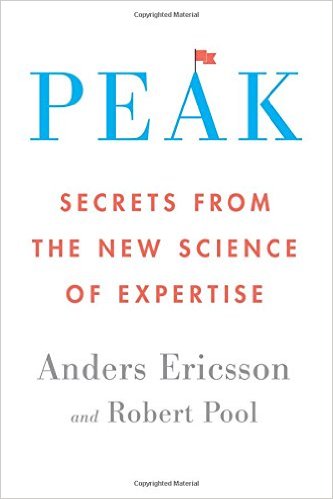 By now, the concept of the "10,000 hour rule" is so widespread in pop culture that few people are likely to be aware of the researcher who started it all. That man is Anders Ericsson. His terrific book Peak: Secrets from the New Science of Expertise is an absolute must-read. What Ericsson has learned about expertise, mastery, supposed "natural talent," and alleged child prodigies is extremely compelling evidence that almost anyone can be good at almost anything. All it takes is the desire, the right guidance, and deliberate practice. The first thing to know is that the "10,000 rule" isn't a rule. It's an urban myth at this point. The idea is that it takes 10,000 hours of practice to become world-class at something. This was drawn from statistics for elite 20-year-old violinists. This group obviously would go on to practice many thousands of additional hours over their professional careers. The number, however, is different depending on which discipline, whether it is music, sports, or some other field. What it takes to master tennis is not going to be the same number of hours as what it takes to master French cooking. The list of "gifts" (read: skills) that are supposedly innate but really arise out of deliberate practice is astonishing. Perfect pitch. Math. Sports. Ability to memorize strings of random numbers. Navigational sense. Even the mystical ability of some autistic people to correctly name the day of the week of any date in history. Everything, it seems, can be taught, learned, and performed at a high level. One of the most interesting findings of Ericsson's research is that IQ actually seems to be a hindrance in certain fields. I'd read that this is true in the business world, because the more intelligent we are, the more reasons we find to talk ourselves out of doing things. Apparently, people who feel like they have to work harder to keep up, regardless of discipline, will do so. Bright people can be really lazy, feeling that we don't need to study or work hard, and creating a fixed mindset that holds us back. I've been doing deliberate practice without realizing it. This year I'm working on public speaking, and when I memorize a speech, I will recite a sticky sentence over and over until I've nailed it. Listening to me rehearse would be excruciating. It would annoy anyone except my parrot. It works, though. I can memorize a seven-minute speech in about half an hour, and have it polished in two hours. In January, I could only make it thirty seconds without my legs shaking so hard I could barely walk afterward. As of September, I've won five ribbons and come in second in a speech contest. Deliberate practice is not fun, just as the book says, but the results definitely make it worthwhile. Ericsson's research on deliberate practice has rocked my world. When I first heard about it, I stopped in my tracks and thought, "What would I want to be that good at?" I couldn't think of anything right away. Then I thought, "What about ONE thousand hours? What about one HUNDRED hours?" That made expertise seem within reach. I chose cooking. There was a noticeable improvement in my cooking skills within only ten hours. By the time I hit 100, I was making up my own recipes. When I took up distance running, I literally couldn't run around the block, and four years later, I ran a marathon. Deliberate practice works. Now all that's left is to choose something else that's worth practicing. Comments are closed.
|
AuthorI've been working with chronic disorganization, squalor, and hoarding for over 20 years. I'm also a marathon runner who was diagnosed with fibromyalgia and thyroid disease 17 years ago. This website uses marketing and tracking technologies. Opting out of this will opt you out of all cookies, except for those needed to run the website. Note that some products may not work as well without tracking cookies. Opt Out of CookiesArchives
January 2022
Categories
All
|
 RSS Feed
RSS Feed